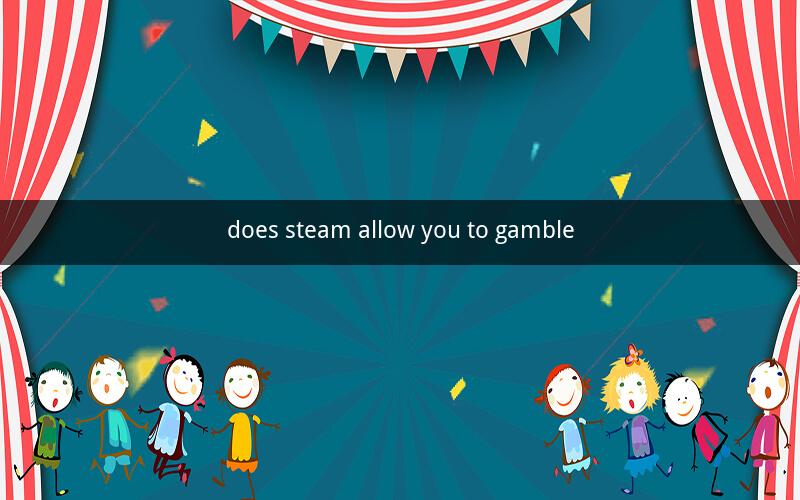
Table of Contents
1. Understanding the Basics of Steam and Gambling
2. What is considered gambling on Steam?
3. Steam's Policies on Gambling
4. Examples of Gamble-Related Content on Steam
5. The Role of Steam Community and its Impact on Gambling
6. The Legal and Ethical Implications of Gambling on Steam
7. How Users Can Protect Themselves from Gamble-Related Content
8. The Future of Gambling on Steam
9. Conclusion
1. Understanding the Basics of Steam and Gambling
Steam is a digital distribution platform developed by Valve Corporation, which is widely used for purchasing and playing video games. On the other hand, gambling refers to the act of betting on an uncertain event with the intent of winning something of value. Although Steam is primarily a gaming platform, it has become a hub for various types of online communities and content, including gambling-related activities.
2. What is considered gambling on Steam?
Gambling on Steam can take various forms, including but not limited to:
- In-game betting using virtual currencies
- Purchasing in-game items or services with the intention of reselling them for real money
- Participating in gambling-like events, such as skins betting, that involve real money
- Sharing gambling tips or strategies in Steam community discussions
3. Steam's Policies on Gambling
Valve has established clear policies regarding gambling on Steam, which are outlined in the Steam Community Rules. These rules prohibit the use of Steam for any form of gambling, including the promotion or facilitation of gambling activities. According to these policies, the following actions are considered violations:
- Creating or using Steam accounts for gambling purposes
- Promoting or facilitating gambling activities within the Steam platform
- Offering or accepting bets or wagers on Steam
4. Examples of Gamble-Related Content on Steam
Despite Steam's strict policies, some gambling-related content can still be found on the platform. Examples include:
- In-game skins betting websites that allow users to place bets using Steam accounts
- Steam community groups or discussions that promote or facilitate gambling activities
- Steam profiles with gambling-related avatars, banners, or backgrounds
5. The Role of Steam Community and its Impact on Gambling
The Steam community plays a significant role in identifying and reporting gambling-related content. Users can flag inappropriate content, and Valve takes action to remove it from the platform. However, it is essential to remain vigilant as new forms of gambling-related content may emerge over time.
6. The Legal and Ethical Implications of Gambling on Steam
Gambling on Steam raises several legal and ethical concerns, including:
- The potential for underage gambling
- The promotion of gambling addiction
- The exploitation of vulnerable users
7. How Users Can Protect Themselves from Gamble-Related Content
To protect themselves from gambling-related content on Steam, users can take the following measures:
- Review Steam's Community Rules and report any violations
- Avoid interacting with gambling-related content, such as in-game skins betting websites or Steam community groups
- Use parental controls to limit access to gambling-related content for younger users
8. The Future of Gambling on Steam
Valve continues to monitor and enforce its policies regarding gambling on Steam. The future of gambling on the platform may involve further strengthening of these policies, as well as increased cooperation with regulators and law enforcement agencies to combat gambling-related activities.
9. Conclusion
Gambling on Steam is prohibited under the platform's policies, and Valve actively enforces these rules to maintain a safe and secure environment for its users. While gambling-related content can still be found on Steam, users can take steps to protect themselves from such content and promote a positive community experience.
Questions and Answers
1. What are the legal implications of gambling on Steam?
- The legal implications of gambling on Steam depend on the jurisdiction. In some countries, gambling is illegal, and engaging in such activities on Steam could result in legal consequences.
2. Can I create a Steam group dedicated to discussing gambling?
- No, creating a Steam group dedicated to discussing gambling, promoting it, or facilitating gambling activities is against Steam's Community Rules.
3. Is it possible to earn real money by reselling in-game items on Steam?
- While reselling in-game items is not inherently illegal, engaging in activities that resemble gambling, such as betting on the outcome of a game or event, is prohibited.
4. Can I flag gambling-related content on Steam?
- Yes, you can flag gambling-related content on Steam using the "Report" button located on the relevant page or profile.
5. What can Valve do to further prevent gambling on Steam?
- Valve can continue to update its Community Rules, strengthen enforcement measures, and collaborate with regulators and law enforcement agencies to combat gambling-related activities.
6. Can I use Steam funds to purchase skins for betting purposes?
- No, using Steam funds for gambling purposes is against the platform's policies.
7. How can I report a Steam account that is promoting gambling?
- You can report a Steam account promoting gambling by clicking on the "Report" button on their profile and selecting "Abuse" as the reason.
8. Can Steam be held liable for gambling-related activities on the platform?
- Valve may be held liable for gambling-related activities if it fails to enforce its policies or if it actively promotes or facilitates gambling.
9. How can parents prevent their children from accessing gambling-related content on Steam?
- Parents can use Steam's parental controls to limit access to gambling-related content, such as by setting age restrictions on Steam accounts.
10. What is the role of the Steam community in combating gambling-related content?
- The Steam community plays a crucial role in identifying and reporting gambling-related content. Users can flag inappropriate content, and Valve takes action to remove it from the platform.